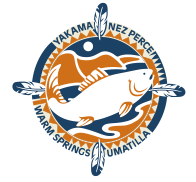Distributed in conjunction with the Coast Salish Gathering and Association of Washington Tribes
Mission, Oregon – Faced with the possibility of impacts to human health, natural resources and economies, leadership of Northwest tribes today called on the U.S. Army Corp of Engineers to conduct a full environmental analysis for all six proposals to transport and export coal through their shared lands and waters.
Today’s action arose from the Northwest Tribal Coal Summit organized by the Association of Washington Tribes and the Coast Salish Gathering in conjunction with the Affiliated Tribes of Northwest Indians’ fall convention hosted by the Confederated Tribes of the Umatilla Indian Reservation.
Driven by exploding Asian demand and declining domestic consumption of coal, export proposals have sprung up at Oregon and Washington ports. Six proposals call for transporting Powder River Basin coal from Montana through Indian and non-Indian lands in the Northwest via rail and barge.
Tribal communities are expressing grave concern about the health and safety impacts from environmental dangers of coal dust.
“Along the Columbia River it’s cliff, highway, railroad, then river. Our communities are wedged between the railroad and the river. We’ve got nowhere to escape,” said Paul Lumley, Executive Director of the Portland-based Columbia River Inter-Tribal Fish Commission. “If we cannot escape, neither will the coal.”
The Tulalip Tribes expressed their concern both environmentally and economically. Tulalip is one of the largest economic engines in the region, along with Boeing. The Tulalips say that an increase in rail traffic along the I-5 corridor to as many as 18 trains a day will bring traffic in the area to a halt, blocking access to businesses, hospitals and fire stations.
“The risks not only to our tribe can be devastating, but also to the entire county,” said Mel Sheldon, Chairman. “We’ve made substantial retail investments that depend heavily on quality of life, and we have collaborated with local citizens to restore and protect our watersheds. We are tracking this carefully, and plan to express our decision on this new threat in the near future.”
Tribal leaders were addressed by Colonel Anthony Funkhouser, Commander of the Northwest Division of the U.S. Army Corps of Engineers, whose agency has federal permitting authority over coal export terminals through the Clean Water Act and Rivers and Harbors Act. The Corps of Engineers announced last week they would conduct an Environmental Assessment rather than a more rigorous Environmental Impact Statement on the Port of Morrow proposal for a new export coal terminal.
“We don’t want the minimum protection any longer, we’re used to getting the minimum”, said Brooklyn Baptiste, Vice-Chairman of the Nez Perce Tribe. “We deserve the maximum attention and expect the lead and coordinating agencies to provide the full environmental studies on all ports, as they will be making one of the largest decisions impacting human health, the environment and economies of not only our tribal communities, but of our neighboring citizens of the Northwest.”
Kathryn “Kat” Brigham, member of the Confederated Tribes of Umatilla Board of Trustees, urged tribal leaders to reach out to neighboring communities, “they have something at risk too.”
In addition to full environmental assessment the today’s resolution passed by the fifty-seven member tribes of ATNI called for full transparency and government to government consultation throughout the entire decision making process the local, state, and federal levels.
“We believe the Northwest is interconnected through the families, resources and waterways, that these coal terminals and railway routes should be addressed in a holistic manner,” expressed by Chairman Brian Cladoosby, Swinomish Tribe. “If a coal train or tanker were to spill on the route or in the river at Port Morrow in Oregon, the water ways will carry the pollution throughout the Northwest, and coal dust will be carried through the mountains in the air we all breath. “
Billy Frank Jr., Chairman of the Northwest Indian Fish Commission added, “The idea of a half-dozen new coal export terminals in western Washington and Oregon — and the hundreds of trains and barges running from Montana and Wyoming every day to deliver that coal — would threaten our environment and quality of life like nothing we have seen before. Coal may be a cheap source of energy for other countries, but these export facilities and increased train traffic would come at a great cost to our health, natural resources and communities.”

